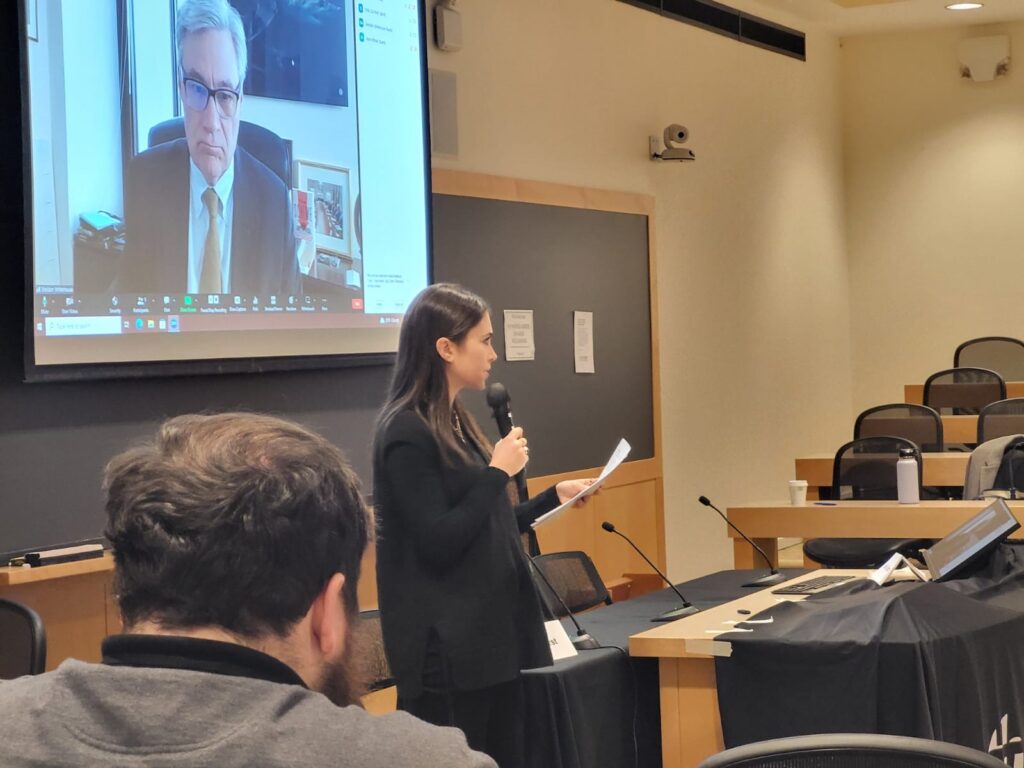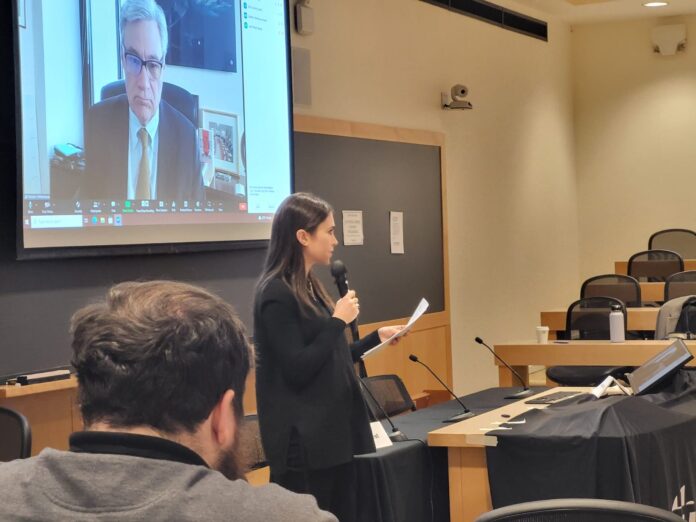All research for this article was compiled by Zachari Curtis, HLS 26’, Patrick Healy, HLS 26’, and Deepika Singh, HLS 24’
Last weekend the Systemic Justice Project (SJP) and the Flaw hosted their second annual Conference on the Corporate Capture of the Legal System. The symposium took place in Pound Hall over the course of two days, beginning on Friday morning on January 26 and concluding on the evening of January 27.
The event was organized by Professor Jon Hanson, Director of the SJP and Editor-in-Chief of the Flaw. A number of HLS students associated with the Flaw, SJP, or enrolled in Hanson’s lauded class, Critical Corporate Theory Lab, helped facilitate discussions, panels, and other events throughout.
Titled “The Most Dangerous Branch: Court Capture, Why It Matters, What Can Be Done About It,” a number of marquee names adorned the guest list: Peter Shamshiri, Michael Liroff, and Rhiannon Hamam of the 5-4 Podcast; Senator Sheldon Whitehouse; author Josie Duffy Rice, J.D. 13’,; Retired Judge Nancy Gertner; Balls and Strikes Editor-in-Chief Jay Willis, J.D. 13’; and several other progressive legal commentators and activists.
Across several discussions, the attendees identified a plethora of challenges facing the American judicial system. In the conference’s opening panel, ProPublica’s Justin Elliot, Joshua Kaplan, and Alex Mierjeski relayed their efforts to hold the Supreme Court accountable through journalistic scrutiny.
The trio co-authored a series of articles on the numerous undisclosed gifts received by Supreme Court Justice Clarence Thomas. After combing through “incredibly redacted” records to analyze the traveling habits of the Justices, their research soon revealed Thomas’ failure to disclose personal gifts was unique on the Court and “an order of magnitude ” greater in scale than any other justice. The revelations of their work have led some to question the ethics of Thomas himself and the Court broadly.
In the Saturday morning event with Senator Whitehouse, he warned that corruption extends far beyond the Supreme Court, to the various federal and state courts of appeal. Introduced as “the leading voice” in the Senate on campaign finance reform, the Senator described how the influence of organizations like Leonard Leo’s Judicial Crisis Network and the Federalist Society have contributed to a biased and cavalier judiciary. In particular, he raised concerns about “appellate factfinding,” castigating the Supreme Court for “finding false facts” in order to reach favorable decisions for their donors, such as Citizens United.
Throughout the programming, various theories of change were proposed. Many speakers emphasized the need for a shift in mindset, away from an institutionalist mode of analysis towards more radical goal-setting.
Legislative remedies ranged from devising a stronger judicial code of ethics to restructuring the design of courts altogether. Whitehouse put forth, among other solutions, an 18-year term limit on Supreme Court justices; justices would then age into senior status and help fill gaps during vacancies.

Much was made of the perceived strategic deficiencies of the Democratic Party in the face of an activist right-wing legal movement. Whitehouse acknowledged that “we have been terrible at looking at the organized nature” of the conservative political project. 5-4’s Rhiannon Hammam later noted during their Saturday panel that the right has “certainly” viewed the judiciary as political “since the civil rights movement.”
There can be too much cowardice in the legal profession, and we need to rally and push forth and be brave.”
Fellow panelist and Balls and Strikes Deputy Editor Madiba Dennie put forth a potential progressive response to originalism and textualism, which she called “inclusive constitutionalism”. As she explains further in her forthcoming book, The Originalism Trap, Dennie argues that by interpreting the Constitution through the lens of the Reconstruction Amendments progressives can develop a jurisprudence that prioritizes the cultivation of a truly inclusive democracy.
Peter Shamshiri went further, asking what “the engine of progressive political change” is? He argued that the “ultimate goal has to be to strip power away from these individuals,” and bring once disempowered people into the process of building “a well-functioning, just society.”
Despite the intricate and formidable obstacles identified by those at the conference, there remained a persistent air of optimism. Senator Whitehouse noted the recent judicial decisions against Alex Jones, Fox News, and the State of Montana as evidence of “honest courtrooms” doing positive work in the country. Dennie challenged young lawyers to avoid being consumed by fear: ““There can be too much cowardice in the legal profession, and we need to rally and push forth and be brave.”
Professor Hanson concluded the conference by quoting excerpts from Frederick Douglass’ speech following the Dred Scott decision, stating “oppression, organized as ours is, will appear invincible up to the very hour of its fall.” He went on to say “my plea for all of us is that we might prove Douglas correct, and that we would attempt to do that by doing it together. I hope this event has helped foster that.”
The Record made no financial contributions to the Conference, but an HL Record writer did participate in planning of the event.


